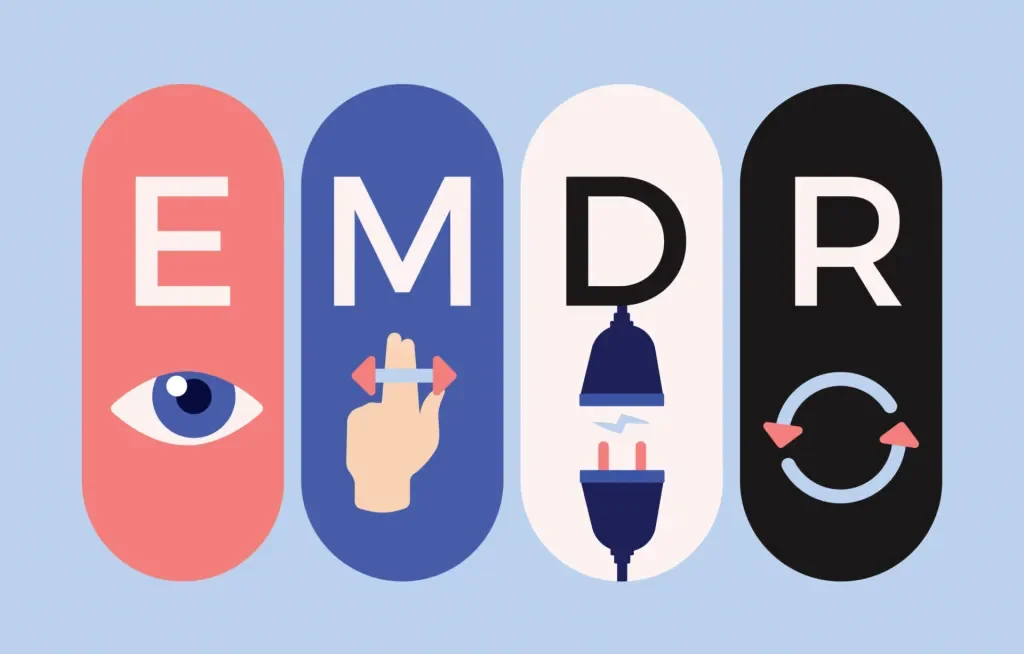Eye Movement Desensitisation and Reprocessing (EMDR)
Eye Movement Desensitisation and Reprocessing (EMDR) is a structured, evidence-based therapy designed to help people heal from the impact of trauma, distressing memories, or overwhelming life experiences. Originally developed to treat post-traumatic stress disorder (PTSD), EMDR is now widely used to address a range of issues including anxiety, depression, grief, and low self-esteem. Unlike traditional talk therapy, EMDR focuses on processing unhelpful memories and emotions that may be "stuck" in the nervous system.
Evidence Base
Eye Movement Desensitization and Reprocessing (EMDR) is an evidence-based psychotherapy originally developed for the treatment of post-traumatic stress disorder (PTSD). Its efficacy and research base have been widely studied, particularly in trauma-focused applications. However, most studies focus on PTSD; evidence for EMDR’s efficacy in other conditions (such as depression without trauma) is growing but less extensive
Learn more>> an article written by Arianne Struik MAPS, Convenor of the APS EMDR and Psychology Interest Group, https://psychology.org.au/for-members/publications/inpsych/2019/june/demystifying-emdr
What Happens in a Typical EMDR Process?
A standard EMDR journey includes several carefully structured phases. Your therapist works closely with you to ensure safety, clarity, and emotional regulation throughout.
1. History & Treatment Planning
You and your therapist explore your concerns, symptoms, and the experiences that may be contributing to them. Together, you identify treatment targets—these may be memories, body sensations, images, beliefs, or recurring triggers.
2. Preparation
Your therapist teaches grounding strategies, nervous-system stabilisation tools, and ways to maintain a sense of control. You do not have to go into the traumatic memory at this stage. The focus is making sure you feel ready and supported.
3. Assessment
You select a specific target memory or trigger. The therapist helps you identify:
The image or moment that captures the experience
The emotions and body sensations connected to it
The negative belief you hold (e.g., “I’m unsafe”, “It’s my fault”)
The positive belief you’d like to hold
4. Desensitisation
This is where the EMDR reprocessing happens. Using bilateral stimulation—often eye movements, tapping, or gentle alternating sounds—the brain begins to process the memory. People often notice:
Emotional intensity decreasing
New insights emerging
The memory feeling more distant or less threatening
5. Installation & Body Scan
Positive beliefs are strengthened. The therapist guides you to notice how your body feels as the distress settles and clarity returns.
6. Closure & Reevaluation
Each session ends by making sure you feel grounded. At the next session, the therapist checks how the memory feels now and whether further reprocessing is helpful.
Most clients find EMDR surprisingly efficient. Shifts can be noticeable even within a few sessions, though everyone’s process is unique.
Speak to our friendly practice assistant about booking an appointment with an EMDR therapist.
References:
de Jongh A, de Roos C, El-Leithy S. State of the science: Eye movement desensitization and reprocessing (EMDR) therapy. J Trauma Stress. 2024 Apr;37(2):205-216. doi: 10.1002/jts.23012. Epub 2024 Jan 28. PMID: 38282286.
World Health Organization. (2013). Guidelines for the management of conditions specifically related to stress. Geneva: WHO. ISBN: 9789241505406.
EMDR-Trained Therapists



